Last week on the Stonemaier Games monthly e-newsletter (subscribe here), I shared a demographic survey with our subscribers. I’ve done this a few years in a row now, with the intent being to learn more about our followers. I try to focus on questions with actionable results.
As usual, I’ll focus on data where a significant change happened compared to previous years, as well as new/revised questions. First, two quick notes:
- You can see my analysis of previous years’ data here (2019), here (2018), and here (2017).
- The motivator for filling out the survey this year was a $100 gift card to our webstore, randomly given to someone for every 1000 responses. We received nearly 4000 responses this year, compared to only 1000 last year when the motivator was for Stonemaier Games to donate $1 per survey response to charity.
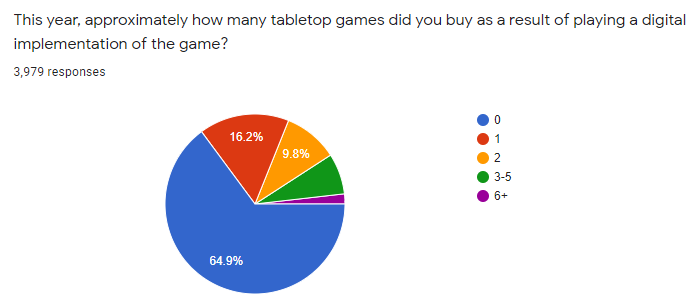
This is a new question on the survey this year, as I wanted to see if the conventional wisdom of digital ports leading to tabletop sales is true (this was inspired by a Daniel Solis tweet that I can no longer find). The results? It appears that most people who buy digital ports of tabletop games don’t actually end up buying the tabletop versions. Yet 35% of people do, which is still significant when you’re looking at tens of millions of gamers worldwide.
I don’t see this result impacting our strategy of offering both digital and tabletop versions of our games. Do you think it should?
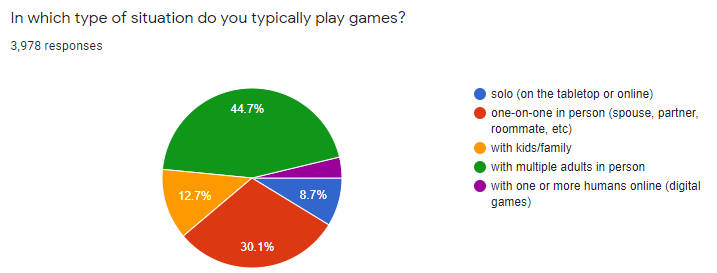
I was really curious how these results would change during a pandemic year, and I added a category of playing games “with one or more humans online.” While only 4% of people replied with that answer, the number of people who play games with multiple adults dropped quite a bit. Kids/family increased by 2 points, one-on-one by 4 points, and solo by 4 points as well.
This indicates to me that having games that play with a variety of ages and at lower player counts is increasingly important.
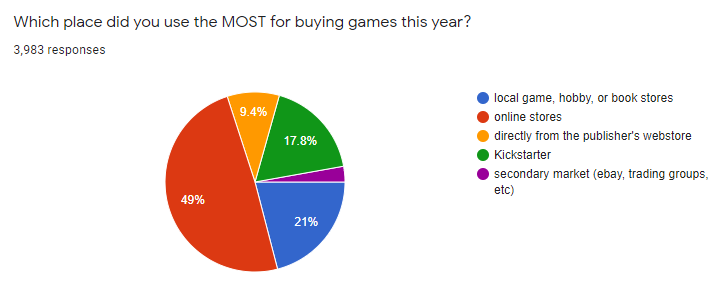
Here’s the first of two related questions. I rephrased it a little this year, as last year I grouped “publisher’s webstore” and “Kickstarter” together. Also keep in mind that these answers are from Stonemaier Games subscribers, and we don’t use Kickstarter.
Interestingly, purchases from local stores didn’t actually decrease much this year despite the pandemic–there’s a decrease of less than 2% compared to last year. Online store purchases increased quite a bit, though–they were up 10%, a slice cut directly out of the publisher/Kickstarter pie from last year.
I don’t think this impacts our strategy, which is that we sell the vast majority of our units to distributors/retailers and some on our webstore.
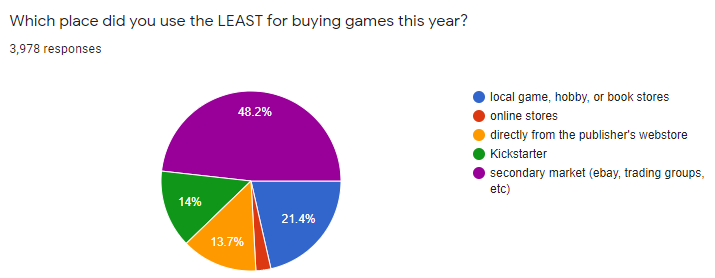
This was really interesting to me, mostly because it appears that while the secondary market isn’t the main way that people buy games, people turned to it a lot more than last year (when 62% of people said they were least likely to buy their games secondhand). That could be related to the pandemic; it could also be related to the increase of Kickstarter-exclusive campaigns that require non-backers to hunt down the games from backers.
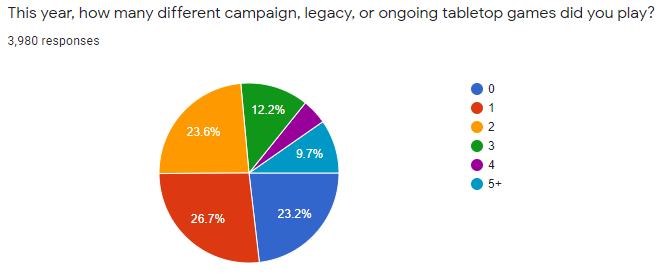
In a pandemic year when it’s difficult to convene with friends, it was surprising to me that this data didn’t change as compared to last year–the answers are almost identical! My best guess here is that people are more likely to play campaign games with family members or solo than friends.
If that’s true, I’m trying to figure out if that could have an impact on how campaign games are designed or produced. Perhaps lower player counts are more important than higher player counts for campaign games? Perhaps campaign length matters less, but length of each session matters more? I personally enjoyed several campaign games 2-player with Megan this year during the pandemic (The Crew, Machi Koro Legacy, and Shards of Infinity: Shadow of Salvation), and those elements were true for all of them. Compare this to the campaign games we finished/started with larger groups before the pandemic (Clank Legacy and Charterstone), as well as an unplayed copy of Pandemic Legacy Season 0 (which we’re excited about but haven’t started in lieu of other one-off games).
***
What do you think about these differences between this year and last year? What are the reasons for these differences, and what can publishers learn from them?
If you gain value from the 100 articles Jamey publishes on this blog each year, please consider championing this content!
40 Comments on “5 Observations from Our 2020 Demographic Survey”
Leave a Comment
If you ask a question about a specific card or ability, please type the exact text in your comment to help facilitate a speedy and precise answer.
Your comment may take a few minutes to publish. Antagonistic, rude, or degrading comments will be removed. Thank you.


[…] can see my analysis of previous years’ data here (2022), here (2021), here (2020), here (2019), here (2018), and here […]
[…] can see my analysis of previous years’ data here (2021), here (2020), here (2019), here (2018), and here […]
[…] can see my analysis of previous years’ data here (2020), here (2019), here (2018), and here […]
[…] see it). If you buy a game online–as it appears nearly 80% of people do now based on last year’s demographic survey–you’re not going to see a sticker on the box until the game is delivered to your home. […]
“Perhaps lower player counts are more important than higher player counts for campaign games?” Definitely agree with that, The more players required, the less likely it is to meet the table (more than once)
I think “This year [2020]” is the year I wouldn’t buy a game based on the digital version. I’ve been playing digital only with my group since March and there’s no end in sight so who’s to say when I could get a physical copy to the table? I got sent a promo price for Viticulture, a game I’ve played in person and introduced it to my group digitally. I said I wanted to own a copy… but I want to play my games.
Hi Jamey,
In my group of various gamers, we have finished 2 of 7 legacy games, and of those unfinished games I think we might finish 1. I love Legacy games, but it can be really hard for our particular group to dedicate time to finishing. Part of the problem with our group, we are all young(ish) parents, and we always have kids needing things. so Short easy games seems to be our most popular category.. My wife loves to play games with me, so I find that the two of us can play Legacy games better, after the kids are in bed. So I vote for lower player count as an option.
Legacy/Campaign games:
Pandemic Legacy Season 1: Complete
Charterstone: Complete (loved it)
SeaFall: Incomplete, never going to complete, group lost interest at about play 5
Fabled Fruits: probably never going to finish despite being easy quick play, just doesn’t have depth of play.
Pandemic Legacy Season 2: probably finish, currently delayed by actual pandemic…
Harry Potter Hogwarts battle: incomplete (just having a real hard time scheduling)
Machi Koro Legacy: game 3, will probably finish this one.
As far as buying games, We buy most from Kickstarter or Amazon. I would by local, but we have no local friendly game stores with any sort of real collection of games within 1 hour drive. I also want to include that most of my board games that i have received this year were sent as gifts as well. I also have very little interest in buying from other people. I prefer to get games new. especially legacy games ;)
And as far as Online games. I have played mostly party games online, with family remote during the pandemic. I haven’t played many other games online yet. I think i would prefer to not try the online. I want to get back to playing in person again.
Hi Jamey,
These are great questions to be asking during this time. I have become very enthralled with digital board games this year (which relates to a question posed below). While I did not have the opportunity to respond to the survey, I have been very grateful for digital adaptations as they have allowed me to maintain a community with my family and best friends around the country. I have purchased them both to try new games and to play my favorite games with geographically-distant friends.
I discovered Scythe last year (the tabletop version), which is my favorite game to date, and it has become a regular hit within the digital group. Thank you for all the effort that you clearly put into this game (and production of all Stonemaier games for that matter). More so than any other game I’ve played, Scythe really stands up to the replayability, with each game feeling unique and fresh every time through (with maybe a dozen physical games played and 80 hours clocked on Steam). I also appreciate your community involvement and outreach. I really admire how you share your process, analyze your options, and honestly consider community feedback.
All that said to ask the question: Will there be a Wind Gambit DLC for Scythe: Digital Edition? This would be a great addition to our already spectacular game nights.
Thanks again for all the hard work!
PS I originally sent this as a Question on the Stonemaier Comments page, but it was requested that I repost here :)
Karl: Thanks for your comment! I’m glad you enjoy Scythe, though I can’t take any credit for the digital version–that development is the hard work of the Knights of Unity (who I hope will add the expansions).
Thank you for sharing the outputs from the survey!
Fascinating insights here – especially about the shift in player counts. I’m sure the low play counts play two fold, 1 – pandemic environment scenarios (access to players). 2 – Ease of set up / management (access to equipment). For example, it was true for me that my favorite games were best suited for 2 players because my spouse and I were kept at home, but it was also true that tabletop RPGs became easier to play in a virtual environment because they are easier to manage/coordinate virtually.
It would be awesome for future surveys to host a question asking for an email address / name for those open to a virtual roundtable or follow up survey for additional details.
Thanks Abagail! For future surveys, I think the best way is for me to recommend that people subscribe to this blog (RSS or email), because I always talk about the results we’re willing to share here. :)
I would definitely be interested in legacy/campaign games that are designed for less people. Availability to play becomes a real problem for larger groups and campaigns drag forever or get dropped completely. My wife and I will play campaigns just the two of us but with legacy games we always feel like we ‘wasted’ or missed a large part of the game since most are designed for higher player counts.
I would think that more campaign/legacy games should be designed for lower player counts. Sure, there are some larger gaming groups who might have the dedication and availability to agree to play repeated plays of a campaign game. Look at the longevity of D&D and other role-playing systems. But, I assume a larger segment of the casual gaming market is comprised of a consistent player count of only 2 or 3 players. This is most definitely an assumption since I don’t have any data to reference.
I was lucky to have a group of friends play through an entire campaign of Seafall, and we had a great time. But, there were spans of nearly a month where we were not all available at the same time to get together. Sometimes, the story will simply lose its momentum when you experience long breaks like that. You still feel excited to get back to the table, but obligation peeks its way to the forefront a bit more. Sure, you can play Seafall with 2 players (we played with 4), but I read it was best at higher player counts- I wouldn’t want to “waste” such an investment on a lesser experience.
That certainly is a tricky thing about putting player counts on the box. Sure, a game might be playable at many player counts, but what if players tend to not have memorable or notable experiences, or- worse yet- they have negative experiences at those specific player counts? Are gamers really mindful of designers’ or publishers’ reputations of printing unsuitable player counts on their games? I tried to be as informed as possible as a gamer (and consumer) when purchasing and playing games. I will only put a game on the table when it matches the best recommended player count (according to boardgamegeek.com). I just wonder how many gamers only look at the player count printed on the box and have bad experiences with a game because they aren’t playing at optimal player counts. And, how often do negative experiences deter gamers from buying or playing other games from the same designer or publisher?
I was one of the one’s who said they are least likely to buy from secondary sources such as Ebay. I just prefer to buy my games new. I like the feel of opening it myself and seeing all of the pieces new and still sealed up, packs of cards wrapped, and punch boards un punched. While I’m sure there are plenty of sellers that take excellent care of their games, just nothing beats, for me, a new un opened game.
This year I buy many versions of phisical games that I have because for us is the only way to play.. We are italians, and we work as nurse/paramedics, not the best situation to risk. The “digital way” saves our group..
But, on the other side, I bought a great number of games to play solo version, or to play “in the future”.. A strange year guys..
Firstly, plus one to including a question about gifts. I’d say that at least 50% of the new games I acquire these days, particularly first hand, are gifts.
On the digital/legacy front, personally I’d never played a digital game that I, or one of my gaming group, didn’t already own prior to this pandemic (with a small p) year. That’s changed for me, I would rather find out if I like something with the “full” physical experience then pick up the digital version when I know that I like it since in the before times digital was a way of getting in games with time strapped friends, and we didn’t want to waste those precious game sessions with things we didn’t know we liked. Now that far more gaming is digital and remote for us we’ve taken to trying games out that we would have bought instead. Part of that is that we’ve tried more campaign games because those digital gaming sessions have been (slightly oddly) more regular and scheduled than previous physical meet-ups, so those longer commitments have seemed like less of an additional commitment. Making a possibly unwarranted extrapolation, maybe with the greater difficulty of engaging in any kind of gaming at the moment, engaging in the inherently more commitment requiring legacy format games has seemed like less of an additional weight on people. I have to think through and organize every game night now instead of just turning up at a group or game night and playing whatever’s on the table, so the idea of the extra planning of a campaign or Legacy game seems more natural than it did before.
Interesting graphs! Thank you so much for sharing this data
For the digital leading to in-person product question, a lurking variable may also be what paradigm was the question being viewed under. As one may consider (1) tabletop ports like the Wingspan version on Steam (a virtual product of a physical product that already exists) and play the digital first to then be inspired to get a physical one. Or (2) a game that solely exists as a digital product first (i.e. Frost Punk) which then goes on to be made into a game, in this case via kickstarter, and had 18,975 backers. I bring this up as the latter may not have been considered when being viewed by participants due to potentially varying paradigms. Just thought I should bring this up for your consideration from my PhD research methods lens. :)
“It appears that most people who buy digital ports of tabletop games don’t actually end up buying the tabletop versions.”
I know for me it often works the other way around. I have already played the physical version, so I buy the digital version to play on the go or when I can’t have a group of friends around (like during a pandemic).
Examples for me include Carcassone, Elder Sign, Kingdom Builder, Summoner Wars, Ticket to Ride, and Tokaido.
Thanks Shaun! Dusty mentioned this on Facebook too, and I need to add a question that asks it that way.
Came here to say the same thing. I answered that I do not, however I do purchase digital if I enjoy the in-person experience (i.e Wingspan).
same here, I rarely play digital first but when there is a good digital implementation (especially on BGA) it help introduce the game to my group friend so it goes on the table more.
Another factor is a lot of digital ports come out significantly after the tabletop game is released. Because of that a lot of people will buy the tabletop version first, since at the time of purchase it is the only version available.
I jumped on to back this up. I too usually buy a physical game and then see if there is a digital version of it to play with friends. My physical games usually require a game night or organized event to get onto the table, but I constantly have 20+ tables of various digital games going.
Sometimes that is because from our board gaming group of 5 people, only 3 really connected with that game. So it might not hit gaming night again for a long time, but we keep playing it with just the 3 of us online.
I think the question about where you buy games the least is difficult because there might be (as there were for me) several places people did not buy games. I also get most of my games as requested gifts at Christmas or for my Birthday, so it would be interesting to see how many games are given as gifts.
I would be interested in adding a question about gifts, perhaps focused on giving or receiving.
Nice data.
I think an interesting question would be something like, “How many times were you interested in buying a physical board game, but after you tried the digital version you ended up not buying the physical board game?”
This was my thought, along a similar vein- I rarely play digital games, but when I do, I do so with an intent of wanting to buy the physical copy- or I play a game I own as I want to learn the rules or play it online because I know the rules. So, if I only play a digital games four times a year, but, buy once, that’s a 25% return. So, knowing how often or how many digital games you play is more important than just asking how many physical copies you may have bought.
I like that! I’ll consider that for next year.
I answered 0 to the first question, primarily because I haven’t actually played any digital games this year (I haven’t really played any games since March, thanks COVID-19)
There might be some confusion about that first question, because most digital implementations of board games don’t have to be purchased. I’ve personally bought at least 4 games after playing a free digital version (in the last couple years). I’ve rarely buy a digital version of a game that I hadn’t already played (or purchased) the physical version.
So, depending on how people read the question, the answer might indicate that even releasing free digital versions of games is worth it in eventual sales.
Agreed. I hope Jamey changes the question for 2021.
Yep! There’s a note about this below in response to Lisa and Jake.
For the first question/answer, your conclusion stated: “It appears that most people who buy digital ports of tabletop games don’t actually end up buying the tabletop versions.”
However, this doesn’t account for people that don’t buy digital ports of tabletop games at all! I answered “zero” for THIS reason, not because I bought a digital game and then didn’t buy the physical game.Maybe rephrasing the question next year could help distinguish? (i.e. start with “If you bought a digital port….) or include an answer choice that says “did not buy any digital ports.”
Thank you for mentioning this as a “Zero” responder. :) I was one of the 6+ answering people, and I had this same concern as well while taking the survey. I agree that both of your suggestions would be a great update to the phrasing for next year… but instead of “If you bought a digital port” I think it should be “If you PLAYED a digital port…” (several great free digital options). And then having an answer option for “Did not PLAY any digital ports this year.”
Interesting to see the results of the survey this year though anyway! It is great to read that still 35% of people said they *did* buy a game after a digital play. It seems a lot of anti-digital gamers feel that platforms like Tabletop Simulator (my favorite option) hurt the industry’s physical sales, but in my experience I have only seen my friends end up with tons of more games in their collection after first experiencing them on TTS.
Lisa and Jake: Thanks for bringing this to my attention. I like the idea of rephrasing it next year to “If you played a digital port…”
Also— I wonder if other people did this as well; for legacy games, I answered about games I was playing before the pandemic, but have put on pause, as I believe the survey just asked about this year as a whole and didn’t seem to specify that you needed to have finished them.
That’s true! While it’s felt like the pandemic covered the full year, we didn’t start acting on it until mid-February (and that’s just us–each household may have acted on different timelines).
I am not sure the question about if we bought a game as a result of playing the digital version gets the full picture. This only captures an answer from people who say it was the direct motivation for buying the physical game, but I’m thinking about a few games I enjoy that I have been playing online lately. I may get one or more, but since I enjoyed them before playing online, I don’t know how I would have answered your question… but there would be no doubt that playing it online keeps it in my mind and may have an impact, even if I am not thinking about online play being my main motivator.
Wow! These are some interesting finds indeed! Thanks for sharing.